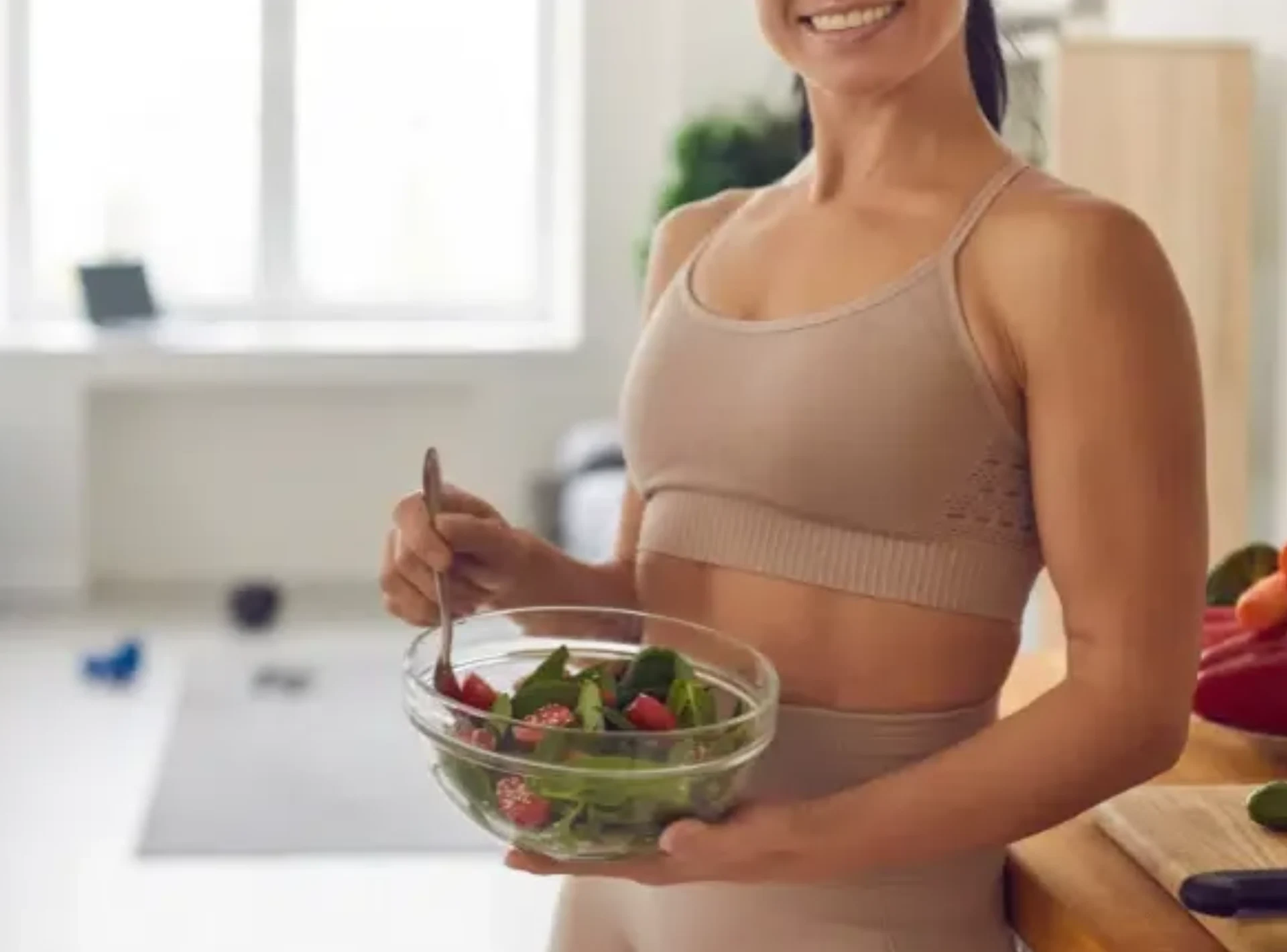Liposuction is one of the most popular procedures that patients request. Body sculpting with liposuction can improve the appearance and contour of your body. Many people report an increase in self-esteem after having liposuction. A common myth about liposuction is that you can go back to the habits that made you get it. On the contrary, maintaining results after liposuction necessitates making certain lifestyle changes.
Patients frequently inquire about whether they must adhere to a special diet following liposuction. In general, a proper and balanced diet will prevent much of the weight gain associated with poor eating habits. To maintain favorable results after liposuction, eat more fruits, vegetables, whole grains, and lean protein while limiting your intake of sugars, simple carbohydrates, and saturated fat. Eating several smaller meals throughout the day will help you stay energized and avoid feeling deprived in between meals. Frequent hydration is also essential. Drinking plenty of water throughout the day helps to control hunger, maintain a healthy metabolism, and aid digestion.
Although liposuction can significantly improve your body’s contours, it is not magic. You can still gain weight after liposuction if you resume your previous, unhealthy eating habits. It is an invasive procedure that requires time and money. Protect your investment in yourself and begin making lifestyle changes prior to your procedure. You’ll be able to enjoy your new contours for a long time if you adopt healthy eating habits and live a healthy lifestyle.
Liposuction In Dubai
Liposuction in Dubai is a popular cosmetic procedure that removes stubborn fat deposits from areas like the abdomen, thighs, arms, and waist, allowing patients to achieve a more sculpted and contoured figure. The treatment is performed by skilled surgeons who use advanced techniques such as tumescent or laser-assisted liposuction, ensuring precision, safety, and minimal downtime. Liposuction in Dubai provides effective, long-lasting results for those seeking body reshaping and increased confidence.
BOOK AN APPOINTMENT TODAY
Why Is Diet Important For Recovery After Liposuction?
You can’t just get rid of fat with liposuction and be done with it. Your body just went through a lot of stress, so it needs time and the right nutrients to heal. A bad diet can make it take longer to heal, make the swelling worse, and even change the outcome. You can help your body heal faster, lower inflammation, and keep your new shape looking great if you eat right.
The right food can help:
- Help the body heal faster
- Lessen swelling and inflammation
- Take care of your new body shape.
Inflammation is one of the main things people worry about after liposuction. As part of the healing process, your body will naturally swell. But some foods can make it worse and make you look puffy for longer than you need to. Foods that are good for you can help reduce swelling and get you back to looking and feeling your best faster.
You may also have problems with nutrient levels being out of balance. It has been found that liposuction can sometimes lower levels of important minerals and vitamins, such as magnesium and vitamin D. It’s important to get these nutrients back into your body through food because they help repair tissues and keep your immune system strong.
If your doctor gives you antibiotics, eating foods like yogurt or fermented vegetables that are high in probiotics can help keep your gut healthy and help your body heal.
Importance Of Nutrition After Liposuction
After liposuction, it’s important to eat well to help your body heal and get the best results. After surgery, your body needs extra care, and the right foods can help reduce swelling, speed up recovery, and keep the results for a long time. Nutrition can make a huge difference in how you feel if you know how it works with your body.
It helps your body deal with changes better.
MEET THE EXPERT DOCTOR
Why Nutrition Affects Healing
In order for tissues to heal and repair themselves, they need certain nutrients. Your body needs amino acids to repair cells and make new ones. Lean proteins, like chicken, fish, and plant-based proteins, like lentils, give your body what it needs. To help your body heal after surgery, try to eat 30–40 grams of protein at each meal.
Citrus fruits, bell peppers, and strawberries all contain vitamin C, which helps the body make collagen and heal wounds. At least 80% mg per day is recommended, but 250 mg is better.
Getting enough nutrients in your food will help reduce inflammation a lot. Berry, spinach, and broccoli are some foods that are high in antioxidants and fight oxidative stress. This helps the body recover more quickly and evenly.
Every day, try to drink at least half of your body weight in ounces of water. This is good for your health because it gets rid of toxins and reduces swelling.
Role Of Nutrition In Enhancing Results
Also, good nutrition helps your skin stay flexible and your body keep its shape after the procedure. Healthy fats, like those in nuts and avocados, help your skin stay soft while you heal.
Aim for four to five small meals a day. This will help keep your blood sugar level steady and make digestion easier. Whole grains help you stay full of energy all day.
Long-Term Benefits Of A Healthy Diet
A healthy diet not only helps you keep off the weight, but it also speeds up your metabolism. Every day, make sure you eat fruits, vegetables, and lean proteins. This will help you keep your results outstanding.
Making these habits a part of your life will help you live a healthier one overall.
Foods That Promote Healing
Concentrating on a healthy liposuction diet plan can greatly speed up your recovery and, in the end, improve your surgical results. A healthy, well-balanced diet lowers the risk of complications, helps your body heal, and lowers inflammation. Healing foods will help you get better faster if you include them in your meals.
1. Eat Protein-Rich Foods
In order for tissues to heal, especially muscles, they need proteins. You can get a lot of high-quality protein from lean meats like chicken, turkey, and fish without adding any extra fat. Some of the best foods to add to your meals are eggs, beans, and lentils.
Don’t forget to include protein in every meal! Make a tasty chicken salad on the grill for lunch, and scramble eggs with spinach for breakfast. Try plant-based proteins like tofu, tempeh, or quinoa as a change of pace. They will make meals more interesting and healthy.
2. Include Vitamin C Sources
Collagen synthesis, which is important for rebuilding soft tissues and healing wounds from surgery, depends on vitamin C. Some foods that are high in this vitamin are bell peppers, oranges, strawberries, and kiwis.
Berries are especially good for you because they are full of vitamin C and antioxidants that help reduce swelling. Adding a bowl of mixed fruits or steamed broccoli to your meals will help you eat more during the day.
3. Add Omega-3 Fatty Acids
People know that omega-3s can help reduce inflammation because they are anti-inflammatory. Fish like salmon, mackerel, and sardines are great sources.
You can make snacks or smoothies plant-based by adding flaxseeds, chia seeds, or walnuts. A piece of grilled salmon or a handful of walnuts in the afternoon would do the trick just fine.
4. Consume Zinc-Rich Foods
Zinc is an important nutrient to eat while you’re recovering because it helps your immune system work and lets cells heal. Great sources are foods like almonds, chickpeas, and pumpkin seeds.
To boost your zinc levels, eat some roasted chickpeas as a snack. You can even make your salad healthier by adding some pumpkin seeds.
5. Prioritrize Antioxidants-Rich Vegetables
One of the main jobs of antioxidants is to stop inflammation and make healing easier. Leafy greens like spinach, kale, and Swiss chard are great sources of both of these nutrients.
Adding a spinach smoothie or a colorful vegetable stir-fry to your daily diet will help keep your meals more interesting and your nutrition in check. Aim for at least six servings of fruits and vegetables every day to help your body heal faster.
6. Stay Hydrated with Water and Electrolytes
Staying hydrated is a key part of getting better. Every day, drink half your body weight in ounces of water to get rid of waste. Also, it helps reduce inflammation even more while keeping your skin soft.
Drinks that are high in electrolytes, like coconut water or sports drinks, can help you get those minerals back. Making sure you drink enough water can be easier if you carry a reusable water bottle with you.
Best Plastic Surgeon In Dubai For Liposuction
Best Plastic Surgeon in Dubai for Liposuction is available at Perfect Doctors Clinic, where skilled surgeons use advanced techniques to remove stubborn fat and precisely sculpt the body. Liposuction is a surgical procedure that removes fat deposits from various areas of the body, including the abdomen, thighs, arms, hips, and chin. It is not a weight-loss procedure but rather a body contouring treatment that improves shape and proportion. When combined with a healthy lifestyle, the effects are long-lasting, giving patients a slimmer, more defined figure.















































